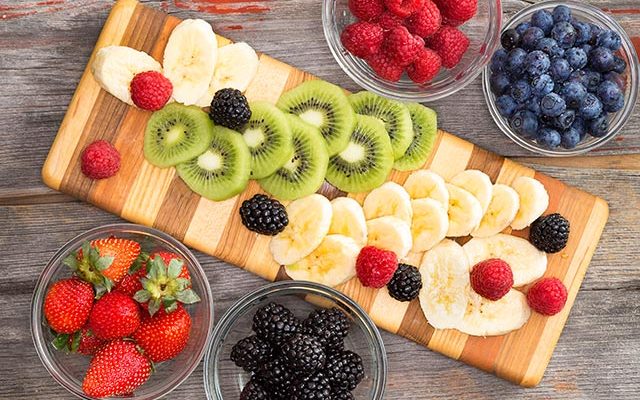Fruits are packed with health benefits as they are naturally low in fat, calories and sodium. They are also healthy snacks when you feel like munching.
Singaporeans have a love-hate relationship with food. On one hand, we are always on the lookout for new and exciting culinary finds. On the other hand, we become more health-conscious and actively plan for optimum nutrition in our diet. It can be ‘painful’ to read food articles or watch cooking shows on TV, knowing that what’s featured might not be the best for us.
Healthy Fruits to Snack On
While the oft-quoted saying “an apple a day keeps the doctor away” may be somewhat oversimplifying it, fruits are definitely healthy snacks packed with health benefits as they are naturally low in fat, calories and sodium. In addition, many fruits are rich in fibre, keeping us feeling fuller longer and thus preventing us from overeating.
Fruit also provides a rich resource of nutrients which can be seen from their bright colours! The colour, smell and taste of a fruit comes from the plant’s phytochemicals. These plant-chemicals are believed to offer a wide range of health benefits, including those with antioxidants properties, carotenoid from orange-coloured fruits, and anthocyanin from red, blue and purple coloured fruit and vegetables.
If you want to keep the doctor away, the magic number is two servings of fruits per day.
Related: Fruits and Veggies
Health Benefits of Fruits
Here are some interesting facts about fruit that you can use to interest your friends and family at your next dinner conversation.
Healthy Fruits to Eat
Apples — Besides being a notable source of phytonutrients and antioxidants, apples also work as a natural mouth refresher, cleaning your teeth with each bite, while leaving behind a pleasing aroma in your mouth. Do note that an apple’s flavour and aroma come from fragrance cells found in its skin. So for maximum taste and added fibre, leave that skin on.
Bananas — Bananas contain one of the highest amounts of potassium found among fruit. A medium-sized banana contains around 422mg of potassium (about 10%) of the requirement for an average adult. Potassium is an important nutrient for the functioning of muscles. To hasten the ripening process of a banana, place it in a paper bag. The reason this works is that bananas and other fruits such as apples produce ethylene gas — which helps to trigger ripening. Contrary to popular belief, placing bananas in the fridge does not cause them to go bad faster. While the outer skin does indeed turn black and patchy, the fruit inside stays relatively unaffected and can last for about an additional week, as compared to leaving it outside the refrigerator.
Berries — Among all the fruits, berries contain the highest amount of antioxidants. The antioxidant properties of these fruit help to fight off diseases and potentially prevent cell deterioration. Ranked in order of antioxidant content are blueberries, cranberries, blackberries, raspberries and strawberries.
Durians — Durian lovers will be pleased to know that there are many health benefits of consuming this love-it-or-hate-it fruit. The fruit is full of vitamins and minerals, including vitamin B-1 (thiamin) and B-6 (pyridoxine), contributing 31% and 24% of RDA respectively for adults[1]. It is also a good source of dietary fibre as five seeds provide 16% of our dietary fibre requirements. You might be surprised to know that durians actually contain zero cholesterol, since cholesterol is only found in animal products. Nevertheless, because of its high sugar content, they are relatively rich in calories, (250 kcal over five seeds), so do consume in moderation (not more than four seeds per sitting).
Related: Harness the Goodness of Fruit and Vegetables
Daily Fruit Serving Size
Finally, how much fruit should you be eating in a day? The recommended daily consumption is two servings. The general guideline of one serving of fruit looks like this:
- 1 small apple, orange, pear or mango (130g)
- 1 wedge of papaya, pineapple or watermelon (130g)
- 4 small seeds of durian or jackfruit (80g)
- 10 grapes or longans (50g)
- 1 medium banana
- 1 cup of dried fruit (40g)
Now that you know your fruity facts, go ahead and grab some healthy fruits to snack on that’s not only delicious but also good for your health.
Read these next:
- 5 Good Eating Habits to Achieve Your Health Goals
- Age Well by Eating Well
- Build a Healthy Diet Meal Plan
- Eat the Rainbow to Beat the Blues
References
Rudrappa, U. (n.d.). Durian fruit nutrition facts [Website].
Retrieved June 2016 from http://www.nutrition-and-you.com/durian-fruit.html



